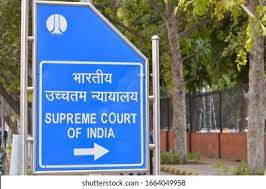Who was compulsorily retired as Sr. Manager, was denied the benefit of leave encashment, employer’s contribution of provident fund, gratuity and pension (Para 1)
The appellant by filing the writ petition did not challenge the order of compulsory retirement and only claimed the terminal benefits i.e., leave encashment, employer’s contribution of provident fund, gratuity and pension. (Para 3)
On filing the Special Appeal by the Bank, the Division Bench allowed the same in part maintaining the order of grant of leave encashment, but setaside the grant of provident fund (Bank’s contribution) and gratuity on the pretext that by an act of the appellant, loss has been caused to the Bank. (Para 4)
Let us apply the said Rules to the facts of the present case in the context of the allegations made in the charge sheet dated 16.10.2009 and supplementary charge sheet dated 20.11.2009 to consider the position that emerges. (Para 11)
It was alleged that while granting the loans or extending cash credit facilities under the CGTMSE or otherwise, due diligence of the procedure was not followed by the appellant. (Para 12)
However, the said Regulations are silent on the contingency as to what would happen if an officer is met with a penalty of compulsory retirement. (Para 15)
The provisions of Gratuity Act make it clear that forfeiture of gratuity may be directed to the extent of damage or loss so caused or destruction of property belonging to employer. In twin situations where the termination is due to riotous or disorderly conduct or involvement of the employee in a criminal case involving moral turpitude, the gratuity shall be wholly forfeited. (Para 17)
In the said explanation, the denial of gratuity to an employee, who is inflicted with the major penalty of compulsory retirement, has not been included. Therefore, the gratuity is payable to the appellant under the 1979 Regulations in terms of the explanation under the said Circular. Even otherwise, if we see the provisions of the Gratuity Act, gratuity can be withheld in case of damages or loss so caused or destruction of property belonging to the employer or otherwise where the termination of service is due to riotous or disorderly conduct or due to criminal case involving moral turpitude. (Para 22)
The facts of the case at hand are not a case of riotous behaviour of appellant or his involvement in any criminal case. As discussed hereinabove, while dealing with the issue of forfeiture of employers’ contribution of provident fund in the enquiry report, no finding regarding causing loss to the bank or on quantification of the amount of loss has been recorded. (Para 23)
In the facts of the present case, the said judgement squarely applies looking to the situation wherein the quantification of loss has not been proved in the enquiry. Even otherwise, prior to passing of an order of forfeiture of gratuity, opportunity of hearing has not been afforded to the appellant. We acknowledge the view taken by the Full Bench in the said judgment and reaffirm the same. (Para 25)
We affirm the findings of the learned Single Judge and set aside the judgement rendered by the Division Bench. The appeal is allowed. No order as to costs. (Para 27)
SUPREME COURT OF INDIA
2023 STPL(Web) 405 SC
[2023 INSC 979]
Jyotirmay Ray Vs. The Field General Manager, Punjab National Bank & Ors
Civil Appeal No. 6611 of 2015-Decided on 06-11-2023.
https://stpllaw.in/wp-content/uploads/2023/11/2023-STPLWeb-405-SC.pdf







